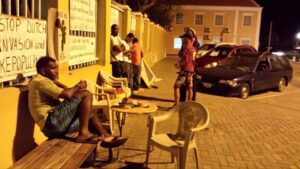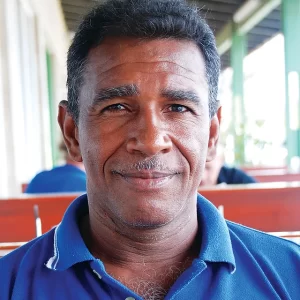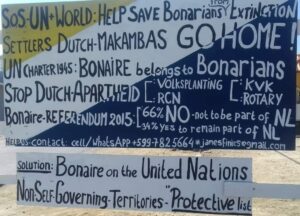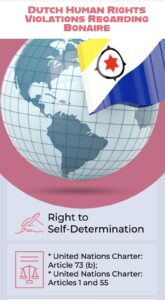|
Getting your Trinity Audio player ready...
|
Reading Time 10 mins
December 20, 2022
THE BONAIRIAN PEOPLES’ STRUGGLE FOR SELF-DETERMINATION
INTRODUCTION
 Today’s challenges, such as climate change (global warming), lingering aftershocks of the Covid-19 pandemic, the war in Ukraine, rising authoritarianism and fascism, and the withering away of democracy, are severe threats to world peace. Yet, as the mainstream and social media platforms guide their audiences’ attention to these potentially apocalyptic narratives, a group of forgotten Caribbean peoples and nations are still strangled by Dutch neo-colonialism. These nations have not advanced beyond the residuals of the world’s main historical holocausts, the slave trade of Africans, and the World Wars.
Today’s challenges, such as climate change (global warming), lingering aftershocks of the Covid-19 pandemic, the war in Ukraine, rising authoritarianism and fascism, and the withering away of democracy, are severe threats to world peace. Yet, as the mainstream and social media platforms guide their audiences’ attention to these potentially apocalyptic narratives, a group of forgotten Caribbean peoples and nations are still strangled by Dutch neo-colonialism. These nations have not advanced beyond the residuals of the world’s main historical holocausts, the slave trade of Africans, and the World Wars.
This article sheds light on a dark chapter of world history that has not faded but continues to plague our world. Commercial colonial exploitation of these territories, like Bonaire, enriched the colonizers, contributing to the prosperity of today’s ‘leading’ nations. We on Bonaire are not living in a post-colonial era. Still, in the light of the unfinished, uncompleted emancipation of the Caribbean peoples and nations, Bonaire exists as a colonial dependency in colonial-dependent structures.
BONAIRE’S CASE
In 1954, the Dutch Kingdom Charter defined the constitutional arrangements and territories of the Kingdom of the Netherlands. Hence, the so-called autonomous Netherlands Antilles was established, consisting of Curacao, Aruba, St. Maarten, Bonaire, Saba, and St. Eustatius. In 1986, Aruba gained ‘status apparatus.’
On the dissolution of the Netherlands Antilles on October 10th, 2010, the island of Bonaire was officially annexed and integrated under unequal rights into the Dutch constitution without the consent of the People of Bonaire. Their autonomy was reversed as the local government became subordinated to The Hague’s colonial rule.
Mr. Finies, a Bonairean, refused to accept this illegal annexation and abandoned his professional career as a commercial Banker to campaign against this illegality by standing outside the Government’s and Governor’s offices in protest for 222 consecutive days, refusing to go home to force a referendum in 2015. After gaining worldwide attention, a referendum was granted. The question was, “Do you agree with the current status, which is directly linked to the Netherlands? Yes or No?” To this, 66% of the people voted No and rejected the current illegal annexation and status. This result was ratified in the Bonerian parliament as the legal democratic decision of the people
After this referendum, the Netherlands government ignored the choice of the people. Mr. Finies founded the Nos Kier Boneiru Bek (We Want Bonaire Back); NKBB, a civil-society organization endorsed by the people of Bonaire, embarked on an international mission to advance Bonair’s cause. With no prior appointment, Mr. Finies, alongside a civil society group and Mrs. Davika Bissessar, president of Bonaire Human Rights Organization, went to the United Nations Headquarters in New York accompanied by many Bonarians. Against all odds, James Finies spoke at the UN’s Special Committee on Decolonization C24 meeting on June 22, 2016. He denounced the Dutch atrocities against our people, such as violating the UN Charter and International Law. After his presentation, the group met privately with over 20 Missions of C24 UN Ambassadors, who were shocked by the revelation of the Netherlands’ actions. They recommended that for them to help us, we should be included on the United Nations Non-Self-Governing Territories (UN NSGT) list to be protected against Dutch colonialism. And very importantly, we should get our Regional neighbors, Central and South America and the Caribbean, to support this initiative. Furthermore, it was also recommended that we issue a report on what we said so that an UN-recognized organization could independently investigate it. We further got the support of The Conferencia Permanente de Partidos Políticos de América Latina y el Caribe (COPPPAL) by resolutions of Mexico 2012, Bonaire 2016, and Sint Maarten 2017, all support the trajectory of re-listing of Bonaire at the UN NSGT.
HUMAN RIGHTS VIOLATIONS AND DUTCH ATROCITIES COMMITTED AGAINST THE BONARIAN PEOPLES
Bonarians are fighting an uphill battle to safeguard our culture and heritage and maintain human rights from an onslaught of Dutch Immigration policy meant to make us a minority, if not erase us, in our own country. To further their intentions to decimate all aspects of sovereignty, the Dutch took draconic actions that adversely affected Bonairian autonomy.
First, they:
- Took border control over by Dutch Marachausee
- Disarmed all security, even volunteer forces, and engaged in door-to-door campaigns taking away all arms–even pellets guns
- Expanded the foreign-dominated police station and built the world’s 2nd largest jail per capita.
Depopulation and settlers-colonization:
- Open immigration – foreign population doubled from 2010 to 2022; grew from 11,000 to 22,000 – and Dutch European needs only an address and can vote in 90 days in local elections. In 2017, natives fell below 40%, and by 2030, they will be less than one-third of the population on the way to eradication in a couple of decades.
- Dutch government Imposed Euthanasia law on elderly- Draconic laws instituted: Law I: Doctors have the right to refuse medical interventions to people over 70 years old. Law II: Citizens’ human organs are owned by the Dutch state and Dutch-owned medical system in Colombia; COOMEVA is under criminal investigation for illegal human organ trafficking of young peoples’ organs who died in their facilities.
- Dutch government Imposed Euthanasia law – elderly- death rate exploded. before and after with 60% – laws 1: over 70 years of doctors have the right to refuse medical interventions – law 2: all citizens’ human organs are owned by the Dutch state – young people with minor issues dying in Dutch-owned medical system in Colombia, COOMEVA under criminal investigation of illegal human organ trafficking.
- Systematic sterilization of our young women – decline natural birth ca 50%
- Diaspora, kids from native people born in neighboring islands due to medical conditions, are denied reentry into Bonaire.
- Taking kids from their mothers due to poor living conditions and giving them to adoptive Dutch families, paying large sums of money to Dutch families, and leaving local mothers in poverty.
Tax & Land:
- Taxes raised to Dutch-European standards – paying as much tax as in Holland – and income is less than half of what [obtains] in Holland – sending over 60% of the population under the poverty line
- Land and Property taxing – raised
to800 to 1000% – even NGO’s sports facilities, scouting, and recreational parks are taxed excessively and taken over - Sale of 10% of our island to a private Dutchman
- Access to]beaches denied or regulated to locals
Poverty and Financial system:
- Changed our currency from Netherlands Antilles Guilders to US Dollar; as a result– products/food prices cost of living raisedand wages, and income lowered bread price increased by 270%
- Changed policies to Open Market and Free Pricing in our small market led to cartels and price-explosion
- The financial system taken over by Dutch Authority Financial Markets – locals cannot lend anymore – closing off all money-transfer systems such as Western Union, etc. – closing/breaking down of all credit payment systems, cooperative systems, and credit unions that help build our island – public housing financing and self-build housing shut down.
- Utilities such as water and electricity were taken over by Dutch Authority Consumer Market – before, a couple/household paid ca $100-200 p/month – last month, September bill same household bill was $1000 – cut off and reconnection charges are very high
- Over 60% of the population now exists below the poverty line – reports from KITLV, NIBUD, Dutch Human Rights, Ombudsman, Greenpeace, Child Rights, etc.
Education & Culture:
- All levels of education – changed to Dutch norms – reversing our education from native Papiamento to a foreign language – violation of Bonaire children’s human rights of education in the native mother tongue- our native kids sent to lower levels of education- segregation of our youth
- Demoting and firing local teachers and replacing them with Dutch-speaking teachers
- Giving Dutch teachers incentives to migrate – tax incentives/double household premiums, etc.
- Vocational and second chance education – using lack of fluency in Dutch to demote students
- Making
 Bonaire attractive for Dutch interns – giving jobs- which are retained as head or manager
Bonaire attractive for Dutch interns – giving jobs- which are retained as head or manager - Cultural events – The existence of Carnival, Rincon day, and regatta all heavily threatened
- Fishing, hunting our way of life are all heavily restricted and regulated, preventing locals’ access to their natural food resources
- Sea border control–heavily armed coastguard; fishermen, and cultural event regatta, held up and searched at sea and intimidated as terrorists or criminals
Institutional & Business sector:
- Heads of governmental institutions were demoted and replaced by migrating Dutch Europeans
- Local businesses were back-taxed and regulated out of business, and the Dutch took over all local businesses
- Local Tourist Market – regulated and taken over by Dutch
- Now even gardeners, painters, etc., are Dutch
THE QUESTION IS WHAT HOLLAND GAINED FROM THIS ILLEGAL ANNEXATION
With the annexation of Bonaire, the Government of Holland gained the following:
- Full political and legislative power and control over the island
- 200 nautical Exclusive Economic Zone sea miles of the Caribbean Sea
- Complete control over the local airport [and has] engaged in a continuous expansion, developing the airport to military standards and since Bonaire is only 50 miles from Venezuela, with which the USA and the West have an ongoing conflict. The West may use Bonaire as a potential NATO base to pacify Venezuela and the region. The future of Latin America poses a threat of a possible NATO base in front of the coast of South America.
UN CHARTER AND INTERNATIONAL LAW VIOLATED BY THE DUTCH:
The aftereffects of the enslaved [continuous agitation for freedom] and colonized people’s struggle for independence and equality gained momentum in the aftermath of the devastation of World Wars I and II. With over 80 million human lives sacrificed, nations had a new consciousness: no people, no government, big or small, should be held in bondage by another country as all countries should be free and equal to everyone else. That was the unique promise to mankind and hence the birth and the main objective of the United Nations, to maintain international peace and security based on respect for the principle of equal human rights and self-determination of all peoples.
Bonaire’s status does not comply with self-governance standards and represents an incomplete decolonization with a fundamental power imbalance between the territory and the cosmopolis. These contemporary dependency arrangements characterized by political inequality do not meet the standards of democratic governance and merely represent incomplete decolonization, as
Bonaire’s dependency status was a preparatory phase to complete decolonization with a Full Measure of Self-Government with Absolute Political Equality.
The people of Bonaire have an inalienable sacred fundamental Human Right to Self-determination as guaranteed in several International Instruments, which the Netherlands is blatantly violating:
Cosmopolis that maintain territories and territorial arrangements in the Caribbean should adhere to their international responsibilities under the United Nations Charter to advance the territories under their administration to the Full Measure of Self Government.
Bonaire’s civil society Non Government Organization (NGO) commissioned the Dependency Studies Project to do an investigation/assessment of the level of democracy and self-governance in Bonaire. This will be the first time in history that such an undertaking is done by a civil society NGO as governments do these. Due to the high cost of this investigation, we had to raise funds through BBQ, donation drives, lottery, and donation boxes for over three years. A humble Bonerian who wanted to remain anonymous sold a piece of land to help fund the investigation.
This assessment is recognized and accepted by the UN General Assembly as an independent report/assessment as it contains UN GA-approved self-governance indicators used for the investigation/report. It must be noted that this type of report was one of the key documents used in successfully re-listing French Polynesia in 2013 as an NSGT under the UN against France.
List of Rights The Netherlands is Denying the Bonarian People
ASSESSMENT OF SELF-GOVERNANCE SUFFICIENCY IN CONFORMITY WITH INTERNATIONALLY RECOGNIZED STANDARDS: COUNTRY BONAIRE
The assessment concluded:
The inalienable right to self-determination did not lead to a transformational process of decolonization and democracy – but was replaced with a distorted process resulting in the cruel hoax of colonial reform with the Dutch perpetuating the inequality that the process was supposed to replace. It is to be observed that dependency governance is not democratic governance, just as colonialism is not democracy. The public entity renamed ‘territorial public body’ is one of several global dependency governance models erroneously projected in the 21st Century as forms of democracy and applied in a fashion that circumvents the inalienable right to genuine self-determination under international law. This is how the scenario has evolved for Bonaire.” The conclusion is that any projection of Bonaire as a model of democratic governance is illusory at best – deficient by all measures of democratic governance. However, while colonialism remains an oppressive form illegal, its illegality and oppressive nature is often a matter of power, not justice. This is the fundamental challenge to the contemporary process of self-determination and its consequent decolonization for island jurisdictions such as Bonaire.
UN RECOGNIZED REPORT
This assessment is recognized and accepted by the UN GA as an independent report/assessment as it contains UN GA-approved self-governance indicators used for the investigation/report. It must be noted that this type of report was one of the main critical documents used in successfully re-listing French Polynesia in 2013 as an NSGT under the UN against France.
By having Bonaire placed on the list of ‘Non-Self-Governing Territories’ of the United Nations (NSGT), the Dutch government would be obligated, as a member according to articles, resolutions, and treaties of the United Nations Charter, to comply with the following. The Dutch must report annually to the General Assembly on the island’s social, economic, and political advancement, as mandated by article 73 of the charter of the United Nations. Furthermore, the re-listing will allow the supranational organs of the United Nations to assess and intervene, help and support the island where necessary, and supervise all activities and actions that lead towards decolonization and self-governance.
Once these measures are respected, Bonaire will be on the road to reclaiming its inherent right to self-determination and joining the community of nations as a sovereign state since size should never deter a country’s right to live freely.
 Mr. James Finies is the President of Nos Kier Boneiru Bek and Vice President of Bonaire Human Rights Organization. An indigenous Bonarian, Mr. Finies has campaigned for decades to expose the Bonaire colonial situation and raise awareness of human rights violations and the self-determination rights of the people of Bonaire.
Mr. James Finies is the President of Nos Kier Boneiru Bek and Vice President of Bonaire Human Rights Organization. An indigenous Bonarian, Mr. Finies has campaigned for decades to expose the Bonaire colonial situation and raise awareness of human rights violations and the self-determination rights of the people of Bonaire.


